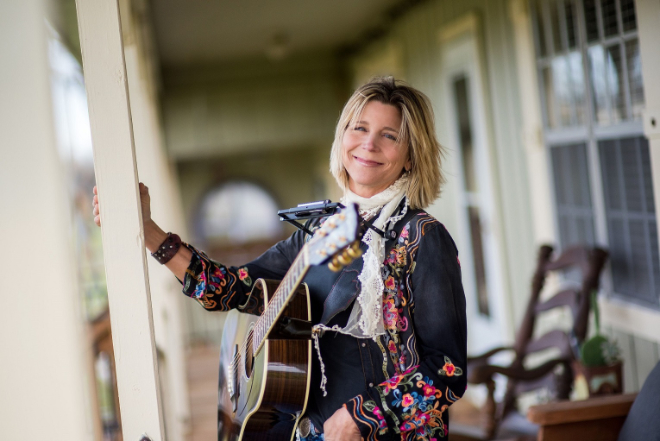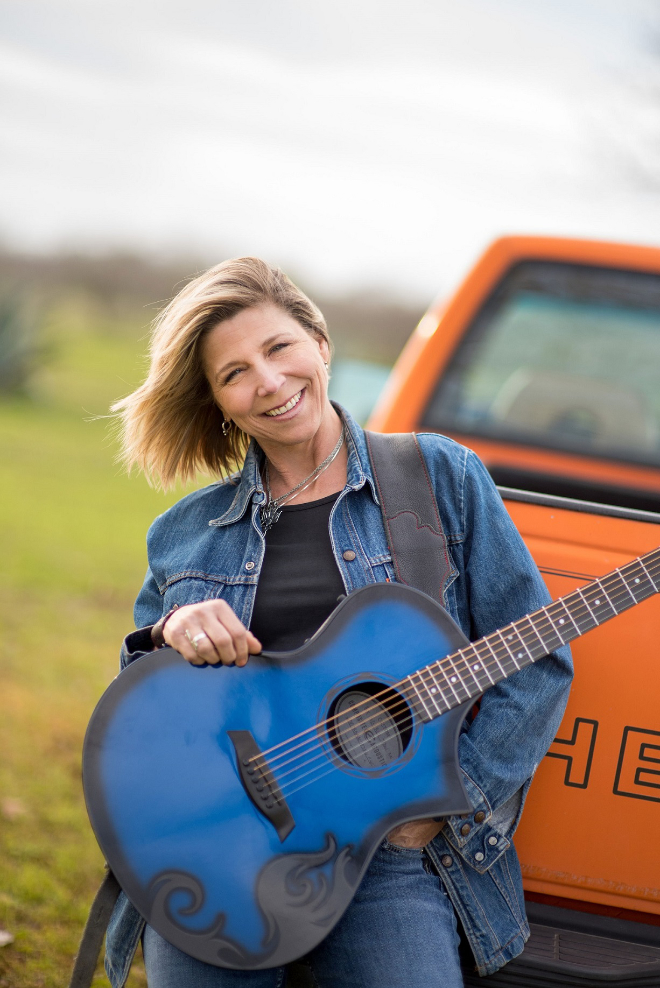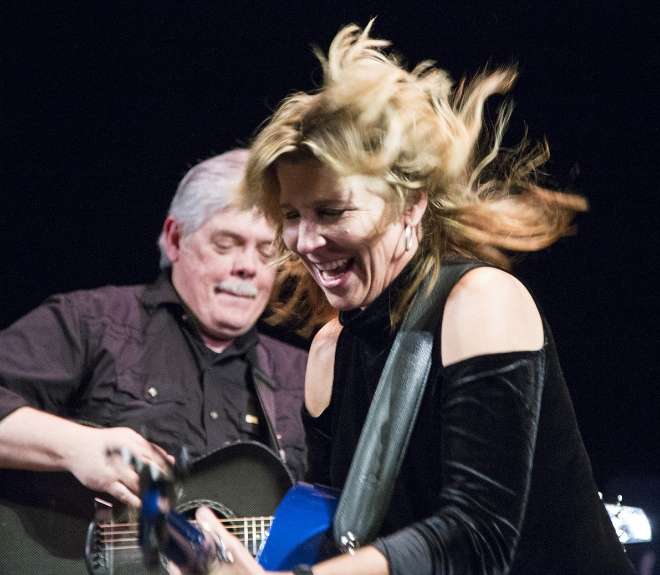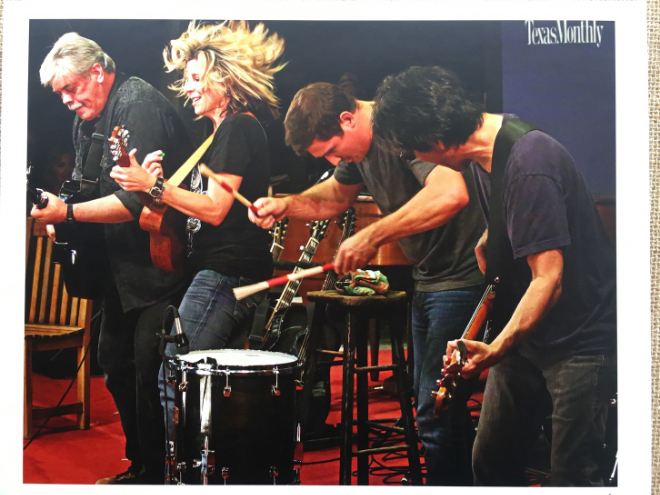Video Feature & Web-Exclusive Interview
Artist: TERRI HENDRIX (with LLOYD MAINES)
Video: “Talk to a Human”
TERRI HENDRIX WITH LLOYD MAINES FEATURED AT BLUE ROCK ALIVE! IMMERSIVE VIRTUAL CONCERT
Terri Hendrix and legendary steel guitar player Lloyd Maines will be the featured artists this Thursday (August 27) at Blue Rock aLIVE!—a unique virtual summer concert series—featuring iconic Austin-based artists every Thursday this summer. Blue Rock’s innovation, quality and creativity is evidenced in concerts produced in broadcast quality audio-video from their renowned Texas room—streamed straight to you. For $25, you can see this concert: https://bluerocktexas.com/events. Or, you can help support Blue Rock and get a Season Pass for $60—where you send in your headshot and they place it on a seat, so you will literally be sitting in the room.
Any interaction with Terri Hendrix, and you immediately see her true character and resilience. You soon realize her genuine care for music history and the need to provide social commentary that is relevant to making the world a better place. With the legendary Lloyd Maines at her side, she takes a pinch of folk and mixes it with pop, country, blues, swinging jazz and techno to serve up her own Texas blend. Maines is a Grammy award-winning Texas-based producer, session player, musician and Austin City Limits Hall of Fame member.
We talked with Terri Hendrix about her joy of spoken word, loops and coloring outside the lines lyrically and musically, her passion to tell a story in song, what continues to inspire her creative process, how she navigates the current madness to remain hopeful, why it’s important for us to get out and vote and how attitude is indeed everything.

Terri Hendrix – Photo credit Kim Maguire
TERRI HENDRIX Interview
with M Music & Musicians magazine publisher, Merlin David
Tell us about one song you plan to play at Blue Rock.
“WASP”—The Women Airforce Service Pilots (WASP)—is a U.S. Army Air Forces program that hired around 1,100 civilian women with non-combat military flight duties during World War II. They were the first women to fly U.S. military aircraft. They tested planes and shuttled them from base to base and oftentimes did the work that men refused to do or were incapable of doing as well as they could. Some women lost their lives on the job and were denied military benefits and burials. The women had to collectively pool their money to pay for their fallen comrades to bring them home. I first learned about them at an exhibit featuring their story at the Bob Bullock museum in Austin, Texas. Ever since then, I’ve wanted to write my own interpretation of their experience.
What did you learn about yourself after recording your latest projects?
Both Talk to a Human and Who is Ann came out at the same time. They are part of a project I’ve been whittling on for the past five years. With Who is Ann, I did all the production. I was familiar with the style of music I wanted and chose to go solo on the production. I became interested in techno music when Enigma burst on the music scene in the 90s with their blend of electronica-infused pop music—I became hooked. They have remained an influence in my music ever since, as have elements of rap, folk, country and basically any artist who colors outside the lines lyrically and musically. I got Lloyd [Maines] to overdub pedal steel and other elements and then merged the music into my own collection of loops and spoken word pieces. I learned I could work the gear on my own time and on my own dime. This was a good thing. It was frustrating at times, but I tunneled through. I’m now learning Logic.
This is a strange and unique time. How do you remain hopeful?
I have to say this year has challenged me mentally, physically and financially. Every day I wake up and think, “What now?” The answers are in front of us: Love thy neighbor. Care for one another. Tackle this pandemic like a team. But common sense solutions take open minds and when you have segments of society taking the low road and ripping one another apart and leadership providing the ammo, you’re gonna land where our country is right now.
How do we take the high road?
I must admit, I have a hard time taking the high road. It’s an everyday struggle. Some of what we are witnessing is madness. To have all my shows cancelled and then see the president on TV without a mask on, holding a rally, and those in the audience not wearing a mask or paying heed to this virus is heartbreaking. But I have no control over that. All I can do is take the high road. See it for what it is, and vote. I can say this with certainty, I refuse to let this pandemic run me out of business or take the lives of my loved ones. We are militant about wearing a mask and stay in our bubble. We feel good with our choices. So how do I stay positive? I work at it—every single day. Happiness takes work. Attitude is everything.
Who originally inspired you to write songs?
John Denver, Dolly Parton and some unknown force in my spirit. I cannot remember not making up songs. I still feel like Dolly Parton is not given the credit she deserves as a songwriter. It bothers me that in 2020, women like Dolly Parton, Carole King, Hank Williams or Cindy Walker are not included with songwriting greats Townes Van Zandt, Guy Clark and Bob Dylan.

Terri Hendrix – Photo credit Kim Maguire
Which Top 5 Musicians inspired you to become a musician?
Opera and classical music: I was in choir and majored in music in college. To this day, anything by Bach can whisk me away.
Dolly Parton: “Coat of Many Colors” and “Me and Little Andy.” I read those lyrics over and over. She wrote them, played them, sang them. It changed my life—made me want to do the same.
John Prine: “Angel from Montgomery.” “How in the hell can someone, go to work in the morning, come home in the evening, and have nothing to say.” In this song you can see, hear, smell and touch their home. Sinking my teeth into his work has always lit me up inside.
Ella Fitzgerald: I call it the note within the note. When a singer finds that sweet spot and takes the note somewhere never gone before. Her improvisational skills would forever alter the way I thought about melody and staying in the safe lane when it came to a particular genre. She was no purist. She just sang and went where the song took her.
My sister: She was not a musician. She was a huge music fan. She believed in me before I did. She believed in me even when I lost belief in myself. She taught me to love and appreciate all music. Even music I may not understand. She listened to everything. I have never met her equal when it comes to true music appreciation.

Terri Hendrix – Photo credit Kim Maguire
What are your Top 5 favorite albums of all time?
Exile on Coldharbour Lane (1997) – Alabama Three [A3]
Breakfast in America (1979) – Supertramp
Rumours (1977) – Fleetwood Mac
Here You Come Again (1977) – Dolly Parton
J.S. Bach: Goldberg Variationen (1980) – Trevor Pinnock
Tell us about your songwriting process.
Sometimes I sit down to purposefully write, and other times I write when the inspiration hits me. Today, I had a little time, so I opened up GarageBand and I started a loop and recorded a bunch of different tracks of things from the news—what people say about the virus that are just bizarre. And that’s the start of a song. I don’t know where it will go. Sometimes there’ll be a line that I like and I’ll text it to myself. I just try to stay open to the muse. I don’t really think about whether I have a melody. If I have a melody, I’ll open my phone up and sing. I just try not to get in the way of the process.
What songwriting tip would you like to offer?
Stay inspired. I constantly listen to music. I buy a lot of music. If people are praising some music, I’ll get it. If people don’t like something, I’ll still get it to see what it’s all about. I have a really huge music collection. I listen to everyone but myself. After I write it, I live it, breathe it. I wouldn’t put my name on it if I didn’t believe in it. But I won’t listen to it after that. I record it and move on.

Terri Hendrix – Photo credit Kim Maguire
What instruments/equipment can you not live without?
My iPhone. I have all these different apps that I really like. I keep my songwriting notes in it. I can open up a recording and snatch something off my iPad. It’s just great to have something portable. I like to have a guitar. I love my Composite Acoustic. I also like this Peterson Guitar made by Neil Peterson. He’s a luthier out of Bandera that makes beautiful instruments using mesquite and long leaf yellow pine. I also have a J-45.
What about accessories?
I like the Bill Stokes capo—it’s titanium. It takes him a long time to make one because he makes each one by hand—but it keeps perfect tune. I love my Hohner Special 20 harps [harmonicas]—nothing else works for me. I like the K&M harmonica holders—those work great.
What other gear do you have?
It took a lot of time to get the things I really like. As far as microphones, I’m still hunting and pecking. I love singers so much and I’m not a big fan of the way I sing. And I can say that with confidence. Singing is just the way I get my songs out there. I use a Shure Beta 58A—just because I can plug that in and get a little bump when I play live—and it’s dependable. I’ve tried the Shure Beta 87A, Sennheiser, Electro-Voice, Blue. But my old go-to is the Shure Beta 58A.

Terri Hendrix – with Lloyd Maines – Photo credit Ira Hantz
What’s next for you?
I’m working on a book about epilepsy—I was diagnosed with it in 1989. I’ve have a wonderful career in spite of it. I started the book in 2003 and I’m about five years past the deadline of when it was supposed to be out. (Laughs) I definitely want another album at some point. I want to record, engineer and produce it by myself.
Tell us about working with the amazing Lloyd Maines.
We started working together in 1997, and we still work together, tour together and run our business together. He’s an amazing musician. He’s in the Austin City Limits Hall of Fame. He’s been on that show more than anyone else in the history of the program. He’s one of the best in the business. Working with him has been and continues to be a real blessing. He brings everything to the table—musicianship, integrity, professionalism.
What’s the best advice someone has given you?
I had always heard this phrase, but really brought it home was becoming friends with Texas Sports Hall of Famer, Nell Fortner. The phrase is “Attitude is everything.” I own my attitude—the highs, the lows. I am accountable for my actions which take seed from my attitude. I lost my sister March 8, 2018. It changed me. I won’t be the same. I have accepted this. That knowledge has folded into my attitude. Now I can move forward. I have a hole in my heart, but I have gone on living and my attitude enables me to do this. I can be of service in this world.

Terri Hendrix – Photo credit Kim Maguire
The best advice you’d like to give upcoming musicians?
The minute a musician looks in the mirror and sees their own significance as being a healing force through their musicianship, is the minute they have become a musician. This knowledge will make one want to embrace their individuality. You’ll want to improve regardless of acceptance or validation in your craft. You’ll be hungry for “it”—the muse, the next song. Attitude is indeed everything.
Where can new fans get more info and stay updated?
https://www.terrihendrix.com
https://www.ownyourownuniverse.org
Social Media
Facebook.com/terrihendrix/
Youtube.com/user/terrihendrix
Twitter.com/terrihendrix
Instagram.com/terrihendrix/
https://open.spotify.com/artist/7JSGrGrjakwMxvAXjHlni1?si=p6UUrGWgRQ6XdC1EtI-mfQ

Terri Hendrix – Photo credit Susie Parrent



comment closed